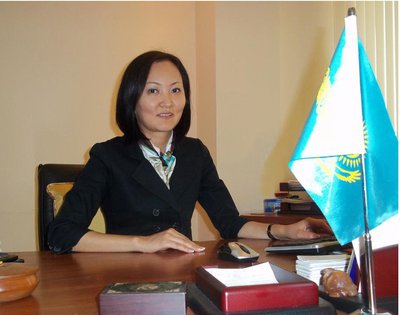9 Feb 2016
MILE Alumni Profiles: Aray Kassabekova
MILE gave me access to an important network.
MILE 5 graduate Aray Kassabekova is one of several WTI alumni in Kazakhstan to have been involved in their country’s accession to the WTO on 30 November 2015. She tells the WTI how the MILE programme equipped her for the arduous work in store.
What was your role in your country’s recent accession to the WTO?
I joined the WTO accession process in 2001 while working at the Ministry of Agriculture of Kazakhstan. I cover agriculture, sanitary and phytosanitary measures (SPS), technical barriers to trade (TBT) and state trading. My task was to assist the government agencies in the negotiations, including drafting of answers to questions of the Working Party Members and corresponding sections of the Working Party Report, conducting legal analysis of the draft commitments proposed by Members and proposing changes to the domestic laws and regulations as well as to the legal acts of the Eurasian Economic Union in the respective spheres.
What was that experience like?
Kazakhstan’s accession was recognised as one of the most lengthy and challenging in the entire history of the post-1995 accessions.
Kazakhstan was actively involved in two parallel processes of WTO accession and the formation of the Customs Union with the Russian Federation and Belarus, which is now the Eurasian Economic Union (EAEU). These two processes, sometimes competing, required the same negotiating team to participate in drafting the EAEU legal framework, in order to ensure that the SPS regulations of EAEU complied with the WTO requirements and future commitments being discussed with WTO Members. This was a lengthy process in the area of SPS. Trips between Moscow and Geneva became routine for me in the last few years.
Several other MILE alumni were also involved in the accession process. In what capacity, and to what extent did you work together?
Yes, there were three other MILE alumni who worked with me in the accession process as part of the negotiating team: Alexander Strokatov (MILE 9), Samal Zharylkassynkyzy (MILE 11) and Assylzat Karabayeva (MILE 14). All of us studied at the WTI under the "Bolashak" Presidential Scholarship Programme funded by the Government of Kazakhstan.
Alexander joined the Center for Trade Policy Development (CTPD) after graduation from WTI and has made a successful carrier there. He is now Deputy Director of the WTO department and covers issues related to customs formalities and import licensing. He participated in introducing amendments into the Customs Union provisions on customs valuation in order to bring them into line with the WTO rules and was in charge of implementation of the WTO Agreement on Trade Facilitation. He is one of the key experts of CTPD.
After graduation, Samal was invited to lead the WTO Division of the Ministry of National Economy of Kazakhstan. She was in charge of general coordination of the accession and implementation of Kazakhstan’s WTO commitments, and covers issues related to import and export customs tariffs, tariff rate quotas and other issues related to cross-border supply of goods.
Assylzat joined CTPD at a late stage in the accession. She participated in the negotiations related to agricultural support. She has been a lecturer at Suleyman Demirel University in Almaty since September 2015 where she teaches courses on WTO laws and economics; political and economic integration; and trade and gender.
Assylzat and her colleagues are planning to launch a Research Institute on Integration in Almaty. She will mainly be responsible for research with regard to Kazakhstan’s integration in the multilateral trading system. Her work will focus on finding ‘alternative measures’ that, on the one hand, are WTO-consistent, and on the other, support domestic production.
How did the MILE programme help prepare you for the role you are in now?
Before MILE I knew very little about WTO rules although I was sure beforehand that my WTO proficiency was quite high. The programme is very intense and very focused at the same time.
After graduation, I was offered the position of Deputy Director General at the Kazakhstan Center for Trade Policy Development, which was established to provide analytical support for international trade negotiations, such as WTO accession, negotiations on regional integration and bilateral investment treaties. My primary task was to train young professionals to work at the Center as part of the negotiating team.
MILE also gave me access to an important network of reputable trade lawyers, economists and lecturers, which I used during my work in WTO accession. For example, we worked with Dr Peter Van den Bossche in the USAID technical assistance project and Pierre Sauvé in the World Bank joint research programme.
MILE is a unique programme and excellent for those who work for the government in the sphere of international trade. I can confidently say that the WTI has changed my life completely.
In conclusion, I would emphasise that the WTI has acquired quite a high reputation in Kazakhstan thanks to ten years of successful cooperation between the institute and "Bolashak" Scholarship Programme.
Further info


